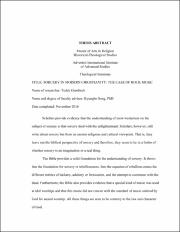Sorcery in modern Christianity : the case of rock music
Abstract
Scholars provide evidence that the understanding of most westerners on the
subject of sorcery is that sorcery died with the enlightenment. Scholars, however, still
write about sorcery but from an eastern religious and cultural viewpoint. That is, they
leave out the biblical perspective of sorcery and therefore, they seem to be in a limbo of
whether sorcery is an imagination or a real thing.
The Bible provides a solid foundation for the understanding of sorcery. It shows
that the foundation for sorcery is rebelliousness. Into the equation of rebellion comes the
different entities of idolatry, adultery or fornication, and the attempt to commune with the
dead. Furthermore, the Bible also provides evidence that a special kind of music was used
at idol worships and that this music did not concur with the standard of music ordered by
God for sacred worship. All these things are seen to be contrary to the law and character
of God.
In modern Christianity, sorcery may exist through many different channels but in
this paper, the research is delimited to focus only on sorcery through the musical channel.
The principles of rock music and all its sisters are in opposition to the principles of sacred
music outlined in the Bible. The biblical principles show that the order of music is
melody, harmony, and rhythm. In fact, rhythm seem to have been of so little importance
in Bible times that no word for it is found in biblical Hebrew.
Rock music, however, turns the order of things around, so that rhythm becomes
the most important entity of the music, then harmony, and last melody. This generates a
powerful rhythmic music that creates abnormal body movements of the listeners. Rock
music makes the listeners addictive, encourages the use of drugs, fosters illicit sexual
behavior, cultivates idolatry, attempts to commune with the dead, and denies the
existence of God. On top of this, rock music provides a subtle channel for the musicians
to communicate to the listeners through the sub consciousness. Most rock musicians
strive to combine their ability and effort with the powers of the occult, and thereby,
fulfills all the biblical objects of sorcery. The understanding of sorcery therefore needs to
be widened to not only include the classical features but also the more subtle, such as
rock music.


